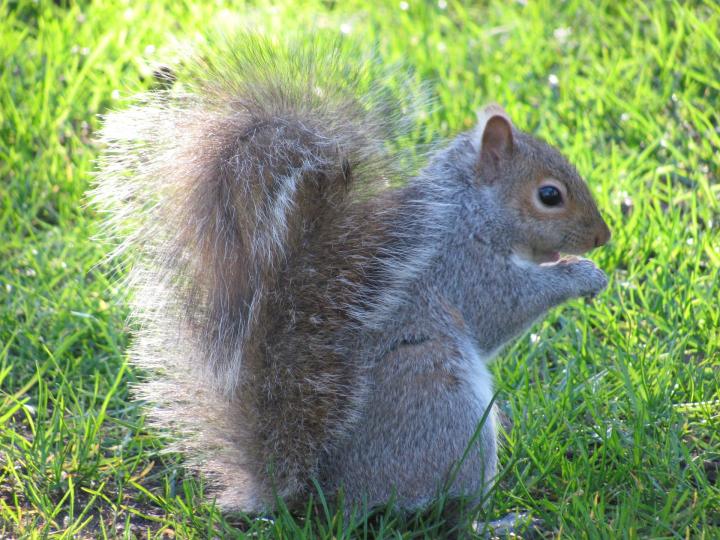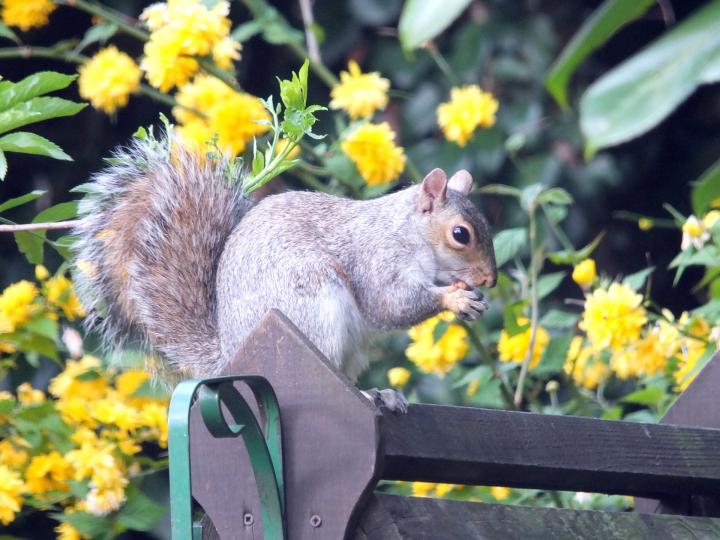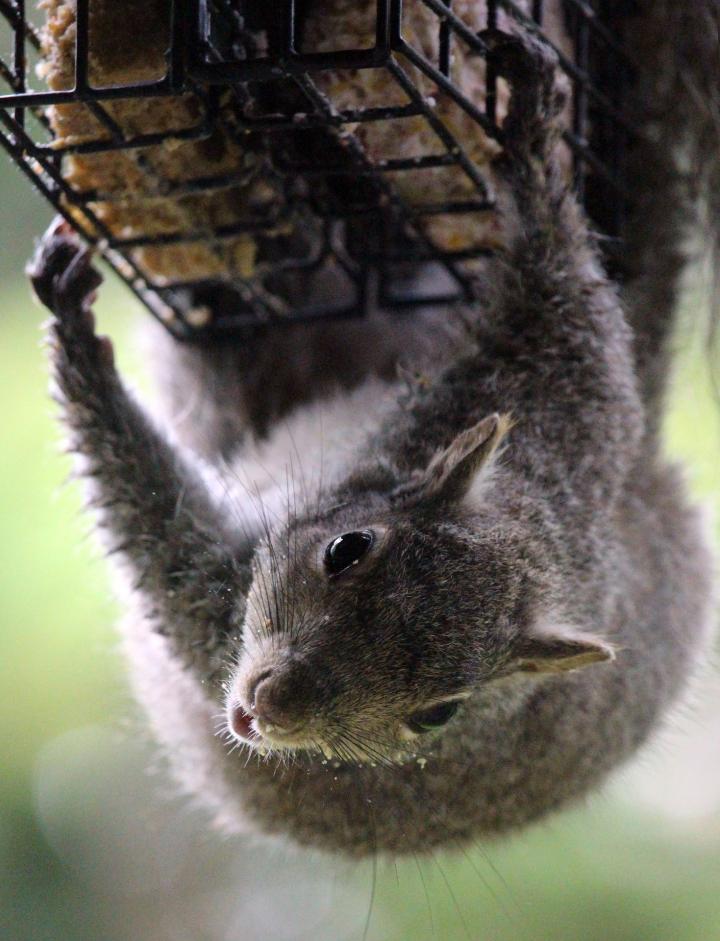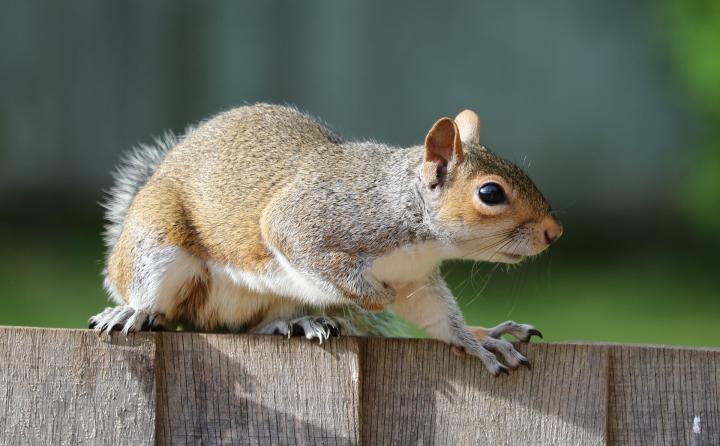
A squirrel enjoys a snack.
Here are tips how to identify and get rid of squirrels, as they can cause many problems in your garden.
Why Worry About Squirrels in the Garden?
With a fondness for fresh fruits, vegetables, and flowers, the common gray squirrel has long spelled trouble for home gardeners. From Maine to Montana, these wily creatures yank geraniums from window boxes, pluck cherry tomatoes from their vines, and strip apple trees like professional pickers. Though their foraging forays can happen at any time of year, a squirrel’s raid in autumn can drive a gardener nuts.
Squirrels are especially active in autumn as they stock up for winter. They do not hibernate (although they may “lie low” during cold spells), so their underground pantries are vitally important winter warehouses. They have a major instinct for hoarding food, which helps them to survive. Gray squirrels stash food by burying it in a scattered fashion around their territory.
Although America is home to several species of squirrels, it is the suburb-savvy gray squirrel, Sciurus carolinensis, that gives gardeners (and people who feed birds) the most grief. How do these clever critters find bulbs, anyway? Why do they ransack some borders and leave others alone? What do squirrels like to eat?
The average squirrel gathers acorns, pinecones, nuts, bark, fruit, berries, fungi, and insects, but is not above stealing bird eggs and bulbs. Sometimes they will even ruin your flowers just for the fun of it! Keep an eye out for these pesky visitors and try some of our tips below for getting rid of them.

Identification
How to Identify Squirrels in your Garden
Weighing an average of 16 to 24 ounces, the type of squirrel that is probably causing damage in your garden is the common gray squirrel. Its color varies from gray, tan, or light brown to dark brown and black. Its belly is light, from white to gray. Its body is 8 to 11 inches in length, and its tail measures 8 to 10 inches. Its vocal call is a rapid CRRK CRRK or QUACK QUACK, similar to a duck. The famous feature of the gray squirrel is its bushy tail, a luxurious puff of fur used for warmth, communication, and balance.
Squirrels have a very keen sense of smell, which most gardeners blame for their bulb pilfering. The nose of these expert foragers is a tiny but powerful tool in the search for hidden nuts and berries. Gardeners aren’t sure whether the squirrels do actively seek out the spring bulbs or not, but the problem of bulb snatching is real and widespread.
Squirrel Damage
- Spring bulbs snacked on? You’re probably dealing with squirrels or chipmunks. Squirrels love to dig up spring bulbs during their autumn foraging—both to eat the bulbs and to use the ready-made holes to store their nuts.
- Squirrels will not only attack your gardens, but your bird feeders as well. If you notice your bird food disappearing rather quickly, you may have a squirrel problem.

Control and Prevention
How to Get Rid of Squirrels
- Try saving orange and lemon rinds and storing them in the freezer during the winter. When you start your garden in the spring, bury the rinds just under the surface of the soil. The rinds will discourage squirrels from digging.
- You can also scatter dog or human hair around your garden. One readers shares, “I used to have a problem with squirrels digging up my bulbs. Now, once in the spring and once in the fall, I ask my hairdresser to save a big bag of hair for me. I lightly dig this into the soil. Squirrels can not stand the smell of humans, so they leave the gardens alone.”
- You can sprinkle blood meal around your garden as well.
- Sprinkle coffee grounds on the soil to keep squirrels from tunneling.
- Don’t trap and relocate squirrels. This is a losing battle since the population of squirrels is extremely high. Also, if the animal is a female there is a high likelihood that you will remove her from babies that depend on her for survival.
Squirrel Prevention
- Don’t advertise your newly dug bulbs by leaving papery bits of bulb debris in or on the soil. Clean up your act, or better still, try not to lay your bulbs on the ground while you dig the holes to plant them—squirrels will smell their favorite and scamper over.
- Want to keep squirrels off your birdfeeders? Place birdfeeders at least 5 to 6 feet off the ground and 8 to 10 feet away from trees or structures. (Squirrels can leap that far and even farther.) Some folks use a pulley system. Add baffles below new birdfeeders. (If squirrels have already used a birdfeeder, they’ll find a way around the baffle.)
- Plant one or two cloves of garlic near your spring bulbs. You can also try sprinkling garlic powder or cayenne pepper on the soil when plants are ready to bloom. The smells should keep the squirrels away.
- Loose soil tempts foraging squirrels, so pack the ground down after planting.
- To protect spring bulbs, line your planting bed with one inch chicken wire and place more wire on top of the bulbs. The plants can grow through the wires, but the squirrels can’t get to the bulbs. Also, consider planting bulbs that squirrels don’t like such as daffodils, ornamental onions (Allium), snowdrops (Galanthus), and grape hyacinths (Muscari). Plus, check out our list of rodent-proof bulbs.
- Squirrels are especially fond of tulips and crocuses, so you might want to avoid them if you have squirrels around.

Reader Suggestions
Here are a couple of suggestions that readers sent in:
- A newly developed motion-activated sprinkler, primarily designed to keep cats and rabbits out of gardens, may help scare away squirrels, especially in small yards or at corners of front yards where damage is most likely to occur. However, the presence of numerous squirrels, stray animals, or children may result in overwatering and high water bills if they continually trigger this device.
- Get some mousetraps. Anchor them solidly to the ground in the area where the squirrels have been digging. Cover them with newspaper, and sprinkle a little dirt on top. When a squirrel comes to dig, it will set off the traps. As the mechanism snaps, it will scare and throw dirt at the squirrel. Once it’s scared enough times, it will find another digging area. Be sure to anchor the traps just in case the wind blows the newspaper off of them. If the trap is anchored, the squirrel will not get hurt.
Do you have any tips for keeping squirrels away? Let us know below!









